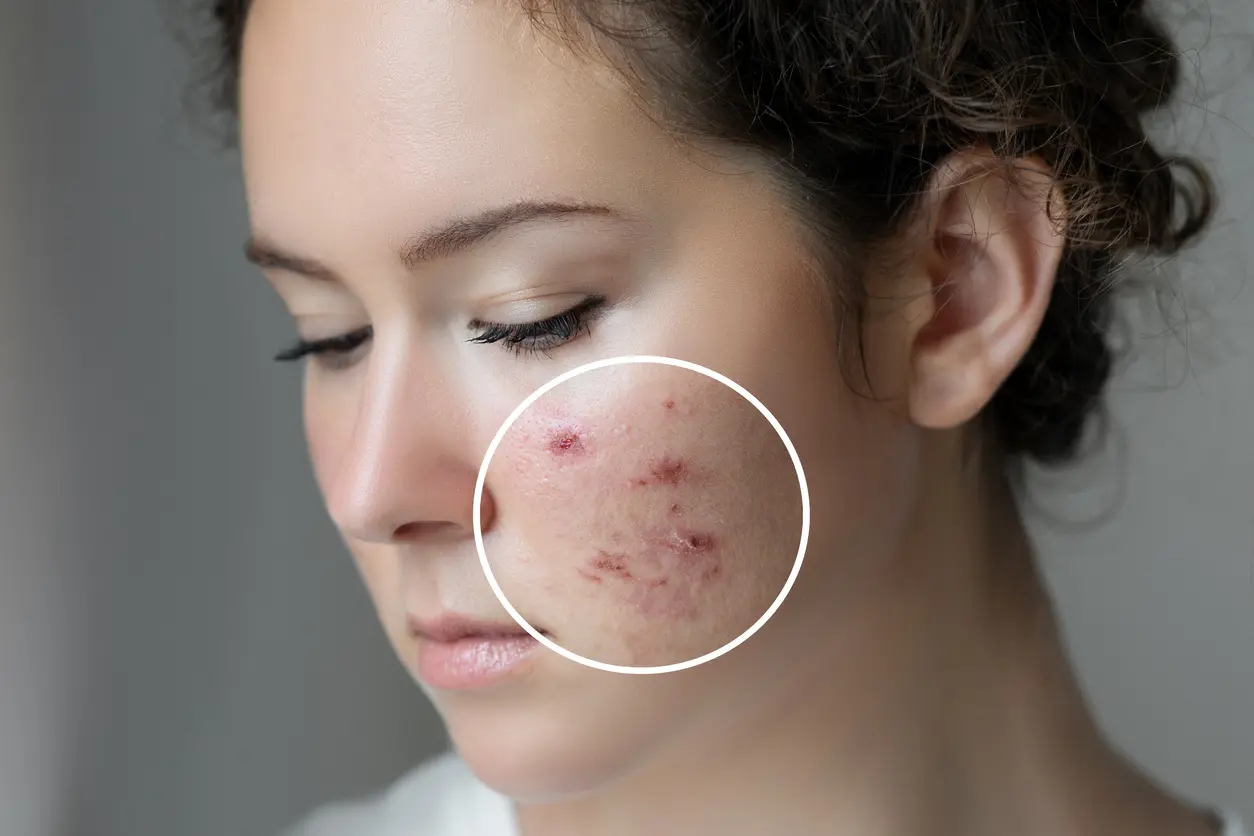How to Treat Acne Scars Effectively
Acne can leave scarring on the skin, which can be challenging to eliminate. These scars can be a source of distress for many people and a reminder of the discomfort caused by acne. Fortunately, various home remedies and medical treatments are available to help reduce the appearance of these scars.
There's a range of effective options, from natural remedies to over-the-counter and prescription treatments, that can effectively treat acne and minimize the appearance of scars. This variety of options provides hope and optimism for those seeking to improve their skin.
Depending on the scar size and type, potential treatments may include:
- Surgery, in some cases
- Salicylic acid peels are chemical peels
- Retinoids and other creams
- Other procedures include laser treatment, microneedling, and light therapy.
Types of Acne Scars: Atrophic, Hypertrophic, and Keloid
Understanding the three main types of acne scars-atrophic, hypertrophic, and keloid-is crucial. This knowledge empowers individuals to make informed decisions about their treatment options, making them feel more in control of their skin health.
Atrophic Scars
Scars appear as small indentations on the skin.
- Scars that look like pinpricks are called cepick scars.
- An indentation in the shape of a boxcar has a transparent edge and is larger.
- Having unclear edges, rolling scars give the skin an undulating or rolling appearance.
Scar tissue formation can be attributed to a deficiency of fibroblasts in the healing process. Fibroblasts are cells responsible for producing collagen and other components essential for wound healing. When there's a lack of these cells, the healing process can be disrupted, leading to the formation of scar tissue.
Hypertrophic Scars
As the acne spot heals, excess fibroblasts are produced by the skin, forming a raised scar.
Keloid Scars
These scars are thicker than the original acne spots and often have hyperpigmentation, making them darker than the normal skin tone. They can be red, brown, or a different colour. Additionally, affected areas may be itchy or painful to the touch.
Types of Acne Scars and Their Features
| Type | Description | Examples |
|---|---|---|
| Atrophic | Sunken scars from tissue loss | Icepick, boxcar, rolling scars |
| Hypertrophic | Raised scars from excess collagen | Thickened scar tissue |
| Keloid | Overgrown raised scars, often darker | Painful, itchy, discoloured |
Natural Home Remedies for Acne Scars
Acne scars can be cleared up with natural remedies. However, the science behind them needs to be clarified. Some may cause further irritation or other problems, so people should use them cautiously.
People have traditionally relied on home remedies for acne scar reduction, such as:
- Pigmentation may be evened out by black seed oil.
- Postsurgical scars can benefit from rosehip oil, which reduces discolouration.
- In addition to helping wounds heal, honey may also reduce scarring in the future.
- This is aloe vera, which is comb-like.
Over-the-Counter Creams and Treatments for Acne Scars
Several over-the-counter products contain ingredients such as retinoids, alpha hydroxy acids, and vitamin C to reduce the visibility of acne scars.
While over-the-counter creams and lotions may provide some relief, it is unlikely that they will be able to reduce or flatten a raised scar fully.
Salicylic Acid
It is a naturally occurring compound found in skin care products for acne. This acid helps to clean the skin by removing dirt, dead skin cells, and other debris that can cause acne. By clearing these clogged pores, salicylic acid peels help to reduce the occurrence of acne.
It is recommended to use a peeling product containing 30% salicylic acid and apply it 3 to 5 times over 3 to 4 weeks. It is not likely to cause hyperpigmentation, making it suitable for darker skin tones.
By applying a cold compress to the area, you can reduce inflammation, swelling, and redness, which may make scarring less visible.
All types of scars can be treated with salicylic acid.
To ensure the product is suitable for their skin, people with sensitive skin should conduct a patch test on a small area before applying it to their face. This will help to avoid any potential dryness or irritation that may occur.
Retinoids
Research suggests that topical retinoids may be effective in treating acne scars. These topical medications can reduce inflammation, lessen acne lesions, and accelerate cell regeneration, reducing the appearance of acne scars.
Retinoids may prove beneficial in reducing the appearance of hyperpigmented acne scars in people with darker skin tones.
It is essential to be aware that retinoids can increase the skin's sensitivity to the sun. As such, anyone using retinoids for acne or scar treatment should apply sunscreen before heading outside.
Alpha Hydroxy Acids
Alpha hydroxy acids (AHAs) have been found to increase the rate at which skin cells are replaced. Medical professionals often recommend these acids to treat acne and reduce scarring caused by acne.
Alpha hydroxy acids (AHAs) can help remove dead skin cells from the skin's surface, revealing the smoother, younger-looking skin underneath. This process can help to reduce the appearance of skin discolouration caused by scarring.
As AHAs can cause swelling, burning, and itching at high concentrations, it is recommended to consult a doctor before using them. This will help to determine the best strength for the individual's needs.
Lactic Acid
Lactic acid, one type of alpha-hydroxy acid, can act as a gentle exfoliator that promotes the removal of dead skin cells. By using the treatment, scars can be reduced in appearance and improve the skin's texture.
A small study involving seven people with icepick scars found that a product containing 92% lactic acid positively affected their skin. One participant experienced an improvement of over 75%, while three others saw a 51-75% improvement. Two participants experienced a 26-50% improvement, and one person saw a 1-25% improvement.
Before using any product containing lactic acid to treat acne scarring, it is essential to test it on a small patch of skin to ensure it does not cause hyperpigmentation. In addition to lightening dark scar tissue, lactic acid may also help reduce acne scarring.
Lactic acid is a common ingredient in many acne treatments and can also be found in diluted apple cider vinegar. This natural alternative is an effective and affordable solution for treating acne.
Silicone Dressings
Although the exact mechanism is not entirely understood, these treatments can help reduce the appearance and size of acne scars. This may be due to the additional hydration they provide to the skin. In addition, they are thought to reduce itching and pain and increase the skin's elasticity.
Wearing dressings continuously can be challenging, yet most people experience no adverse reactions. However, some individuals may experience itchiness or soreness.
Medical Treatments for Acne Scars: From Peels to Surgery
Specific medical procedures may be beneficial in minimising the appearance of acne scars.
Depending on the individual's skin and the severity of the scarring, a dermatologist can advise the best treatment or combination of treatments.
There are several options available:
Chemical Peels
A dermatologist can determine which type of peel is most appropriate for a person's skin, depending on the type of skin, the severity of any acne, and the visibility of any scarring.
A study found that trichloroacetic acid (TCA) chemical peel had a successful outcome in 60% of participants, with at least 70% improving their acne scarring.
In contrast, glycolic acid proved ineffective for 25% of those who tried it, with no noticeable decrease in the appearance of scars.
It may take experimenting with different peels to discover which works best for an individual.
Injections
Corticosteroid injections benefit people with hypertrophic or keloid scars, as they can reduce the size of raised scar tissue and make it smoother.
Regular injections are an effective way to treat skin disorders.
Dermal Filler
In certain instances, dermatologists may recommend soft tissue fillers for treating atrophic acne scars, especially those with rolling or boxcar patterns.
There are several options available:
- Silicon
- Collagen-based products
- Polyacrylamide
- Hyaluronic acid
- Poly-L-lactic acid
- Polymethylmethacrylate
However, it is essential to consult a doctor to determine the type of filler best for your skin. Additionally, additional treatments may be needed to maintain the effects depending on the type of filler used.
Before deciding to get a filler, discussing the possible risks and benefits with a doctor is essential. Different types of fillers can cause various side effects, so it is important to be informed about the specific filler used for the procedure.
Microneedling
The microneedling process involves inserting fine needles near a scar to stimulate the body's production of more collagen. This collagen can help to reduce the visibility of atrophic acne scars, making the skin appear smoother.
Microneedling successfully improved the appearance of atrophic or indented acne scars, ranging from 31-62%.
The combination of microneedling and the application of collagen gel produced significantly better results than simply using microneedling alone.
Some people may also experience bruising and swelling. It is important to seek the advice of a qualified medical professional before receiving this treatment.
Laser Treatment
Laser treatment uses short, concentrated beams of light to penetrate the uppermost layer of skin. Removing dead and damaged skin cells reveals the fresh, younger skin cells beneath. This method of skin resurfacing can help reduce the appearance of scarring and other signs of ageing.
Pulsed dye laser treatment can diminish the appearance of raised scars and lighten the colour of hyperpigmented spots. This treatment is also known to improve the texture of the affected area.
People with lighter skin tones should consider intense pulsed light treatment a viable alternative.
Not everyone can benefit from laser treatment for acne scarring. The type of scarring and the person's skin type will determine whether this method suits them. Additionally, people with sensitive skin may experience adverse reactions to the treatment.
Surgery
Surgery can be used to remove raised acne scars if other treatments fail. Surgery alone may not solve the problem, and a doctor may recommend further treatment.
Electrodesiccation
This treatment is usually painless and does not require anaesthesia. It usually takes several sessions to see results, but the results are long-lasting.
Treatment Options by Scar Type
| Scar Type | Effective Treatments |
|---|---|
| Atrophic (indented) | Microneedling, fillers, laser resurfacing |
| Hypertrophic | Steroid injections, silicone dressings, laser |
| Keloid | Corticosteroid injections, surgery, light therapy |
Final Thoughts: Managing and Treating Acne Scars
People with acne scars can suffer from decreased self-confidence due to the reminder of their acne. Fortunately, various treatments are available that improve the appearance of acne scars and the individual's self-image.
Home remedies can effectively treat mild cases of acne scarring, but more intensive medical treatments may be necessary for stubborn scarring. A dermatologist can help determine the best course of action for reducing the appearance of acne scars.
Dermatologists should be consulted to treat acne scars, as some treatments can be harmful if not applied properly.
Connect with one of our doctors at Mobi Doctor with the click of a button and receive the care you require.






